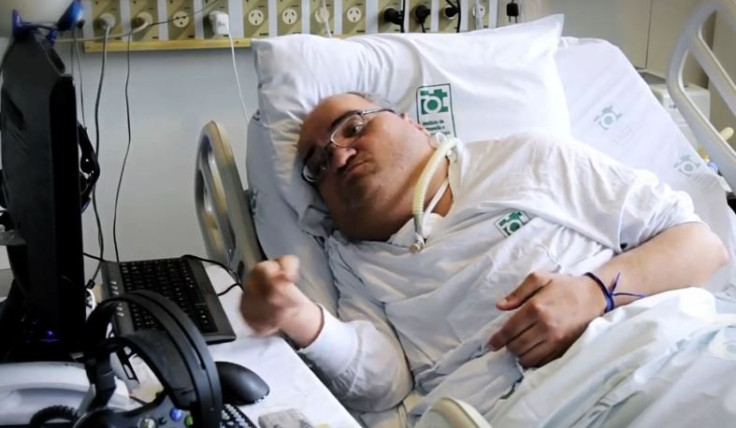
Most people hate the idea of visiting the doctor, let alone stay at a hospital or in the case of Paulo Henrique Machado, living almost his entire life in a hospital. Paulo Henrique Machado suffered from polio as an infant in Brazil's last big outbreak, which resulted in infantile paralysis that requires him to be hooked up to an artificial respirator for 24 hours a day.
Paulo Henrique Machado has been in the hospital at such a young age, that his first memories are exploring the hospital, Sao Paulo's Clinicas, with a wheelchair.
"I explored up and down the corridors, going into the rooms of other children that were here - that is how I discovered my 'universe'," recalls Paulo Henrique Machado to BBC. "For me, playing football or with normal toys wasn't an option, so it was more about using my imagination."
Paulo Henrique Machado's nursing assistant, Ligia Marcia Fizeto, began working at the hospital a little after he arrived. She told BBC that children with polio were kept in a "torpedo" in the 1970s, which was essentially a body-encasing iron lung. Those who were kept in the "polio ward" were not expected to reach adolescence, as their life expectancy was 10 years.
"It was very sad to see all those children, all lying there immobilised in their beds, or with very little movement," said Ligia Marcia Fizeto.
But even then, Paulo Henrique Machado created his own world in the hospital and made friends in his ward.
"There was me, Eliana, Pedrinho, Anderson, Claudia, Luciana and Tania. They were here for a good length of time too, more than 10 years," he says.
Unfortunately, many of the children began to deteriorate over time and he lost his friends slowly.
"It was difficult. Each loss was like a dismembering, you know, physical... like a mutilation," he says. "Now, there's just two of us left - me and Eliana."
How Paulo Henrique Machado and Eliana Zagui have outlived the other patients is something doctors cease to comprehend. Paulo Henrique Machado and Eliana Zagui share a room and the relationship is essential.
"Some people think we are like husband and wife, but we are more like brother and sister," he says, adding that they also fight. "Every day, when I wake up I have the certainty that my strength is over there - Eliana. And it's reciprocated. I trust her and she trusts me."
"I think that's normal between brother and sisters or a couple. But it's not an argument where one side feels offended, you end up reflecting and think, 'OK, I forgive you'," he adds.
Paulo Henrique Machado shares that they must live in a hospital due to the risk of contracting an infection from the outside world. As such, his trips to the outside world are rare, but memorable. He shares that he has been outside at least 50 times in his life and the trips are becoming more frequent with advancing technology and their willingness to take more risks.
"There are some [trips] which stand out, like seeing the beach for the first time when I was 32. I opened the car door and saw the sea and thought 'Wow! What is this!" shares Paulo Henrique Machado.
"I knew the beach only from photos, films, postcards, stories from other people - so I had built up an image in my mind of what the sea and the beach would be like," recalls Eliana Zagui. "They took us out of the vehicles, Paulo was in a wheelchair and they pushed my bed onto the sand. You enjoy these little moments, that many people take for granted. They don't stop to marvel like we do."
And if you think living in a hospital has prevented the two from mastering a craft or starting a career, then think again! Eliana Zagui is a writer--and a published author--who paints using her mouth. Paulo Henrique Machado is a trained computer animator who raised $65,000 to finance a 3D film series titled "The Adventures of Leca and her Friends" which is based off of Eliana Zagui's book that depicts their life.
"I wanted to make it attractive, not just colourful but full of the mischievous games that kids get up to. I think my characters are realistic, because they come from someone who is disabled. I know [exactly] what the difficulties they face are," says Paulo Henrique Machado.
© 2025 Latin Times. All rights reserved. Do not reproduce without permission.





